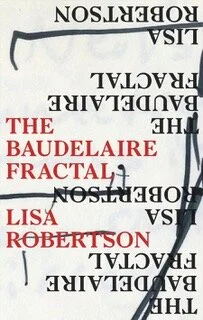THE BAUDELAIRE FRACTAL
by Lisa Robertson
Coach House Books $17.95
Reviewed by Irina Moga
What better way to mark Charles Baudelaire's bicentennial anniversary (the French poet was born in 1821) than to read a singular book whose content references Baudelaire—and in a surprising way. Lisa Robertson's novel, The Baudelaire Fractal (Coach House Books, 2020), was shortlisted for the 2020 Governor General's fiction award. The interest The Baudelaire Fractal had generated, even before its launch, and the significant number of reviews, can attest to the restlessness and curiosity excellent writing will elicit within an ever-widening book audience.
From the onset, the reader is dazzled by how sentences, words, and images spin the fabric of The Baudelaire Fractal. The novel opens with a bang. One morning, Hazel Brown awakes in a Vancouver hotel room with the "bodily recognition" that she has written the complete works of Charles Baudelaire. It's an interesting angle, similar to the one in "Don Juan's Death" by the French author Patrick Poivre D'Arvor, whose main character undergoes a brain transplant and is retrofitted (for lack of a better word) with Lord Byron's brain.
But back to The Baudelaire Fractal—a suite of narratives written in first person point of view, whose timbre sways between prose poem, essay, philosophy, and musings on famous paintings. Who is Hazel Brown? Robertson delivers a sketch of her character at the beginning of the novel:
Here I become a style of enunciation, a strategic misunderstanding, a linguistic funnel, a wedge in the language. Here I'd thought I would destroy my origin, or I did destroy it, by becoming the she-dandy I found in the margins of used paperbacks. What do I love? I love the elsewhere of moving clouds. (11)
The book's strength is precisely the stunning marginalia the author alludes to, written with much gusto and embedded in the plot—which becomes a podium for memorable lines. The book's twelve chapters take us through what may be loosely considered a Bildungsroman, the formative years of its main character, Hazel Brown, in Paris in the mid-1980s. Here is a caveat: the symphonic nature of the book is such that it cannot lend itself to easy deconstruction.
We follow Hazel Brown through her arrival in France via London, and her experiences as a young woman in Paris, exuding jubilance, Cartesian doubt, and intellectual rigor. These years resonate with the author's later perspective on her earlier decades. The themes of the novel—rooms as echoes of lives lived, pliable time, sartorial art, poetics, girlhood, Baudelaire, and many others—aggregate in a movement whose fluidity provides us with clues into the shaping of a mindset. The novel is a swirling monologue architected on a scaffold of lush vocabulary and cultural references.
Words the author uses to portray Baudelaire's writing—"a turbulence that continued outwards, fractal, from the complex curvature of compositional time" (154)—are also suited to describe the rhythm and brilliance of Robertson’s novel.
Romanian-born Irina Moga is the author of four poetry books and a member of The Writers’ Union of Canada. Her work has appeared in Canadian Literature, dandelion, carte-blanche, PRISM International online, The Chaffin Journal and others. Irina’s latest poetry volume, Sea Glass Circe, was selected for an official book launch as part of the 2020 Toronto LitUp!, Toronto International Festival of Authors. Follow her on Twitter @pictopoems.

